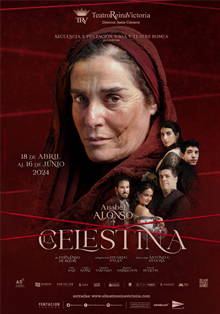Until 16 June, the Teatro Reina Victoria presents an adaptation of one of the great classics of Spanish literature, La Celestina, by Fernando de Rojas, with the actress Anabel Alonso playing the famous and intriguing character.
Twelve years after his last production of La Celestina, playwright Eduardo Galán returns with this new version in which it is the character of Celestina who narrates the events as they happened to Pleberio, Melibea’s father. The cast is completed by José Saiz, Víctor Sainz, Claudia Taboada, Beatriz Grimaldos and David Huertas.
Eduardo Galán once again takes on a new version of one of the most symbolic and representative plays of Spanish theatre. He does so while maintaining the essence of the original tragicomedy, showing authentic characters and a portrayal of the problems of the time. However, in this version, he manages to transfer this essence to today’s audiences. This objective is achieved by giving dynamism to the play, by avoiding baroque paragraphs, maintaining the language of the period, eliminating archaisms and other elements that make it difficult to understand, all without falling into the idioms of our time.
The play tells how Calisto, a handsome young nobleman, enters the orchard where he finds Melibea, with whom he falls deeply in love. Faced with her rejection and advised by his servant Sempronio, he decides to entrust her care to Celestina, in order to win Melibea’s love through her. The procuress manages by trickery to make Melibea fall in love with Calisto. The latter’s servants try to exploit their master’s passion for their own benefit: he had promised Celestina a gold chain if she would help him to surrender Melibea’s will. When this happens, the servants demand their share, and when Celestina refuses, they kill her. They are imprisoned and executed by the justice system.
In the last meeting between Calisto and Melibea, the young young young man jumps over the wall of Melibea’s garden to help another of her servants and falls to his death. This leads to Melibea’s suicide in front of her father Pleberio, who ends the tragicomedy with some moral and existentialist reflections. Tickets can be purchased at this link.







